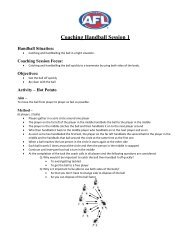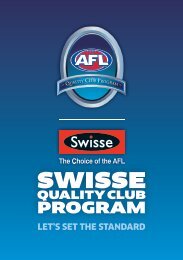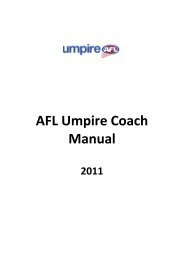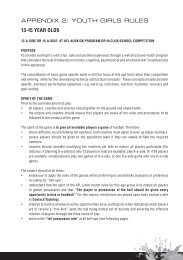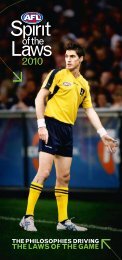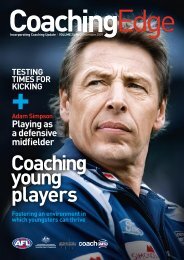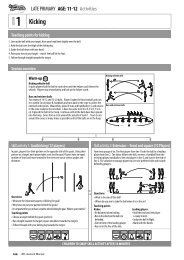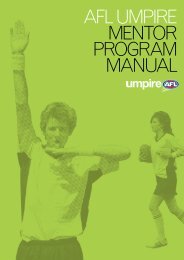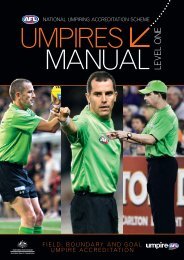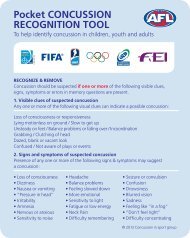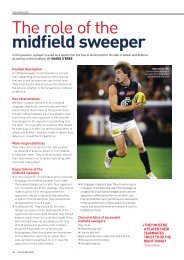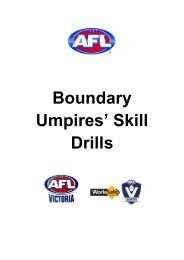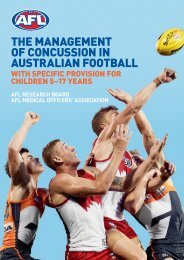Coaching Edge - AFL Community
Coaching Edge - AFL Community
Coaching Edge - AFL Community
Create successful ePaper yourself
Turn your PDF publications into a flip-book with our unique Google optimized e-Paper software.
Given time and more insights, young<br />
players become smarter and can realise their<br />
potential. But, if we believe in coaching, we<br />
should be working to accelerate that process<br />
so that players “know it all” well before they<br />
become redundant on the field, because of<br />
aching limbs, failing eyesight or whatever.<br />
Many former players turn to coaching but,<br />
if they don’t achieve much success, they can<br />
be dropped like hot scones, relegated to the<br />
outer where they might share their experience<br />
with the fan next to them or just watch the<br />
game, at times in silent frustration.<br />
Some who have been elite players continue<br />
to be involved in the media and we can learn<br />
from them by listening to them on radio, TV<br />
or the internet, or we can read their take on<br />
the modern game in the print media or on<br />
the web. Young players today will have been<br />
influenced by the wisdom of the likes of Leigh<br />
Matthews, Robert Walls, Kevin Bartlett and<br />
Dermott Brereton. Their perspectives can be<br />
an invaluable learning tool for youngsters.<br />
But what of other former players? Many<br />
who were once household names in the<br />
<strong>AFL</strong> still have an active interest in the game<br />
but their wisdom is not utilised to any great<br />
extent. Some may be invited to talk at their<br />
former club but may<br />
»<br />
have much more to offer<br />
and, more importantly, be willing to assist.<br />
WORDS OF WISDOM: Young players<br />
will be influenced by former stars and<br />
now media commentators such as<br />
(from left) Dermott Brereton, Leigh<br />
Matthews and Kevin Bartlett.<br />
Solution<br />
to the wisdom waste<br />
<strong>Coaching</strong> has evolved to the extent<br />
that we now have a head coach and<br />
several specialist coaches. In time<br />
we might have one coach per player, all<br />
operating under the guidance of the head<br />
coach. It’s a logical development as the<br />
game becomes ever more professional.<br />
In this scenario, many of the forgotten<br />
players of the game could be used to<br />
mentor a player. They might watch that<br />
player’s every move, and even non-move,<br />
and provide feedback to the player and<br />
head coach. Clearly these mentors would<br />
need to work within the framework of<br />
the head coach’s philosophy; it could<br />
be a recipe for disaster if you had mixed<br />
messages being given to players.<br />
In my role as a sport psychologist,<br />
I have often had to advise players on<br />
how to overcome losses in form or<br />
develop an approach that could enhance<br />
consistency. I always start that work with<br />
a player by asking what the coach wants<br />
the player to do to improve. I then work<br />
within those guidelines.<br />
At a time when I was not working at a<br />
particular club an <strong>AFL</strong> player asked me<br />
to help him develop his game. I trained<br />
myself to watch that player exclusively,<br />
rather than the game. As well as the<br />
typical statistics, I detailed how and<br />
where he gained possessions, saw his<br />
work off the ball, watched how he made<br />
position, tracked his movement around<br />
the field, recorded the impact of his<br />
immediate opponent, and documented<br />
his involvement in the game each<br />
quarter. I was aiming to record every<br />
relevant activity in which the player<br />
was involved.<br />
There was no guesswork in that<br />
process and I could advise the player<br />
how he could improve his output quite<br />
readily. He may have been running<br />
to spots that did not meet the style<br />
demanded by the coach. He may not<br />
have been presenting enough or been<br />
getting to the fall of the ball often<br />
enough. He may have allowed his<br />
opponent too many free opportunities.<br />
Specialist coaches may have seen a lot<br />
of these engagements in the game, but<br />
I believe I saw more of the player than<br />
they did. It’s from that experience that<br />
I came to favour one-on-one mentoring<br />
of players. It can lead to better feedback<br />
and ultimately optimise performance.<br />
Imagine what effect a ball magnet such<br />
as Dean Cox could have been working<br />
with a player such as a young<br />
Patrick Ryder.<br />
Crucial to the success of this proposal<br />
is the need for past players to keep up to<br />
date with the evolution of the game, so<br />
that they can maintain credibility with<br />
the modern player. They would need to<br />
be familiar with the latest jargon and<br />
game plans of the sport. Terms such<br />
as stoppages, press, spread, squeeze,<br />
corridor, talls and smalls need to become<br />
part of their vernacular so that they are<br />
not seen as outdated.<br />
These mentors would need to meet<br />
the coach regularly and perhaps sit in on<br />
some meetings between the coach and<br />
players, so that they are aware of the<br />
game plan and role of their players.<br />
So who is game enough to adopt<br />
such a coaching approach? Maybe, just<br />
maybe, it could provide the edge for a<br />
team to get the jump on the opposition<br />
in the quest for the Holy Grail.<br />
The model could be replicated to<br />
some extent at all levels of football.<br />
Junior clubs could ask senior players to<br />
mentor one junior player. They might not<br />
be expected to watch all games but the<br />
process of observation would be similar.<br />
At a senior level coaches could gather<br />
a stable of ex-players to assist in this<br />
mentoring role. It may be possible for<br />
one mentor to watch two players if the<br />
number of mentors available is less<br />
than 20. If there were only, say, five such<br />
ex-players, they could be asked to watch<br />
a different player each game over four<br />
weeks and provide individual reports.<br />
Or perhaps they could watch one<br />
player a quarter.<br />
Whatever resources can be gathered,<br />
the process could mirror to some extent<br />
what might occur at an <strong>AFL</strong> club with<br />
these ex- players employed at probably<br />
minimal cost.<br />
COACHING EDGE / JULY 2013 // 27



